
Mayors' Dinner Honourees
The Mayors’ Dinner has evolved into a yearly community wide fundraising event that has successfully raised money for the projects of The Working Centre and St. John’s Kitchen over the past 37 years. The Dinner has created memories and has honoured an outstanding group of KW citizens. The majority of dinners have attracted over 700 guests, but more so, a spirit of good will and community commitment has been emphasized and celebrated.
1988 - 1999
2000 - 2009
2010 - 2019
1988
Dominic Cardillo
Dominic Cardillo’s record of service to the community of Kitchener was impressive. Dom was born in Guelph in 1930. He and his wife Mary were residents of Kitchener since 1957, where they raised their children Pat, Mike, Maureen, Lisa, Maria and Paul.
First elected to public office in 1963, Dom served as an alderman for 20 years, a regional councillor for 12 years and mayor of the city of Kitchener for 12 years. Dom’s record of service to the city can be measured by his hard work and commitment with a wide variety of municipal commissions, committees and advisory boards.
Dom’s activity in the community also included 25 years with the County Board of Education, former secretary of the Kitchener Minor Hockey Association, honourary member of the K-W Big Brothers Association, past president of Newman Club and a member of the K-W Italian Cortina Club.
Dom died in 2013 at age 82.
1989
Jonas Bingeman
Jonas Bingeman’s roots in the community ran very deep. Jonas, also known as ‘The Boss’, was born in Kitchener and educated at Waterloo Lutheran University. After completing business studies at Western in 1949, Jonas returned and took over the family business. Today, the Bingeman family operate a hotel, a convention centre, an amusement park and one of the largest catering services in Ontario.
Jonas was as well known in the community for his big heart as for his business empire. He showed continual personal interest and dedication in helping community organizations accomplish their goals. Jonas had a strong commitment to the positive development of the community and it is with great pride that we honoured him.
Jonas died in 1993 at age 67.
1990
Betty Thompson
Born in 1934, Betty was a native of Walkerton, Ontario and received her elementary education in Peterborough, Ontario. While co-hostess of a radio program called “Keyclub Capers” in Peterborough, Canadian Broadcaster Paul Reed suggested that she seek a career in broadcasting. She would graduate from the Radio and Television Arts course at Ryerson Polytechnical Institute in Toronto and was hired as a copywriter by CKCO-TV in Kitchener.
In 1968, Betty entered Teachers College, graduating with the McGraw-Hill award for leadership. She would teach grand one children for two years at Otonabee Valley Public School in Peterborough.
In 1971, Betty returned to CKCO-TV in Kitchener, hired as hostess for CTV’s “Romper Room”, then seen on twenty major CTV stations across Canada. In 1976, she created a new program “Flower Spot” which was syndicated across Canada. Her daily program “Betty and Friends” ran until the fall of 1980. In the fall of 1983, Betty was assigned her own program “Be My Guest”.
In 1977, Betty won the coveted “Person of the Year” Flowers Canada Award. That same year, she was chosen Professional Woman of the Year for her professional success as well as community involvement. Betty was very involved in community. She was the first woman director on the Board of Oktoberfest Inc., and past chairwoman and originator of the Oktoberfest Women’s Committee. She chaired the Special Events Committee for both the Ontario Summer Games in August 1977 and the 1990 Ontario Summer Games.
Betty was a President of K-W Big Sisters, on the Board of the K-W Art Gallery and a past President and Charter Member of Zonta – a professional organization for Women. She also served on the boards of V.O.N., Salvation Army, Parents Are People Too, and the John Howard Society. She formed a new auxiliary, promotional arm of the K-W Big Sisters, called “Best Friends of Big Sisters” mandated to raise funds for Big Sisters on an ongoing basis.
Betty died in 1994 at age 60.
1991
Milo Shantz
Born in 1932 in New Hamburg, Milo Shantz became an entrepreneur early in life. At the age of 13 he started buying and selling pigs. At 21, he bought 500 turkeys with a partner. In 1958, he started a family corporation with his father and brother. In 1970, after many corporate changes, Milo and a group of shareholders founded Hybrid Turkeys. Milo was active with Hybrid Turkeys until 1981 when the company was sold.
Milo was a visionary and life-long entrepreneur who created many successful business ventures including The Mercedes Corporation and Stone Crock Inc. Employee ownership became a fundamental ingredient in the businesses he created and inspired. He was a leader in transforming the small Mennonite village of St. Jacobs into a a well-known tourist destination. His work helped to expand the Farmer’s Market and develop a large factory outlet mall as places where other entrepreneurs and small business could flourish.
As a community minded businessman, Milo was involved with House of Friendship, Habitat for Humanity, many faith-based organizations, and The Working Centre. In recognition of his community leadership, Milo received the Queen’s Golden Jubilee Medal, the Confederation Medal, and an Honorary Doctorate from Wilfrid Laurier University.
Milo Shantz died in 2009 at age 76.
1992
Aloysia Zimmer
Born in Mildmay, Bruce County, Sister Aloysia Zimmer was the second youngest member of a family of ten. She entered the School Sisters of Notre Dame Order in 1927 as a qualified teacher and spent 46 years in the educational field as a teacher, teacher librarian, principal and was the supervising principal of the Kitchener separate Schools for 16 years.
A special tribute was also paid to her by the Ontario Institute for Studies (O.LS.E.) for dedication and accomplishments in education and for her leadership roles with principals and teachers. In 1976, Sister Aloysia was inducted into Waterloo County Hall of Fame for her 30 years of outstanding contribution to education.
When Sister Aloysia retired from the teaching field in 1973, she became retired in a spirit of adding a new dimension to her own life and that of others. She invited Sister Kathleen Kunkel, also a retiree with 41 devoted years of teaching and a good Sister friend, to join her in organizing RAISE (Retirees Assisting In Serving Each Other), a home support service for the elderly in Kitchener, who for the most part were house bound for either physical psychological/financial reasons.
In 1988 the RAISE Board of Directors and staff showered the two founderesses with glowing tributes, awards and gratitude at the Retirement Dinner. Sister Aloysia received numerous voluntary service awards which include the 1981 Senior Citizen Women of the Year, K-W Sertoma Service to Mankind plaque in 1984 and in 1985 Rotary’s Paul Harris Fellow.
Both Sister Aloysia and Sister Kathleen lived their lives filled with spirit and dedication. The Religious community of the School Sisters of Notre Dame have fostered true commitment and dedication to the communities they work in.
Sister Aloysia died in 2002 at age 95.
1993
John Wintermeyer
Cities and communities are built by the strength of commitment that individuals contribute to the common good. John Wintermeyer used his considerable talents to bring respect and dignity to public life. John’s long career is one that can be truly called “a devoted service to a calling.”
Born in Kitchener in 1916, John grew up attending St. Joseph’s Elementary School and St. Jerome’s High School downtown. He would go on to graduate from University of Notre Dame with a degree in Commerce and Philosophy. He graduated from Harvard Law School in 1942 and Dalhousie Law School in 1943. In 1949 he established his own firm which became known as Wintermeyer Askin Casey Smith.
John entered politics in 1952, being elected to three consecutive one-year terms on Kitchener City Council. He was elected as the MPP for Waterloo North and three years later would become leader of the Ontario Liberal Party. After being defeated in the 1963 election, John left politics to practice law in both Kitchener and Toronto.
His dedication to community included: Chairman of the Roman Catholic High Schools for Metropolitan Toronto, Chairman of the Canadian Olympic Hockey Foundation, Director of Hockey Canada, Vice-Chairman of the Canadian Centre for Ecumenism and Honoury Chairman of St. Mary’s General Hospital Fund Drive. He was also involved with St. Mary’s St. Vincent de Paul, chairing the Core Area Ministry Committee, assisting the board of directors of The Working Centre and St. John’s Kitchen and helping establish the board of directors for ROOF (Reaching Our Outdoor Friends).
*Papal Honour: Member of the Order of St. Sylvestre, with the Entitlement, Sir Knight
Civilian Honour: Member of the Military and Hospitalier Order of St. Lazarus of Jerusalem
Professional Honour: Queens Counsel, 1955-1985
John Wintermeyer died in December 1993 at age 77.
1994
Lorna Van Mossel
Born in Shelburne, Ontario, Lorna’s commitment to justice has grew from her own understanding of how to act with compassion. As a Citizenship Court Judge she talked about her ideas on a loving, caring community when she addressed new citizens:
“Recognizing our gifts that we can share in the community”, “Making change possible by breaking down barriers”, “Attempting to make a difference”, “ To have friends, one must be a friend”, “Respecting our differences in a multicultural society”, “As Canadian citizens, we are among the most privileged people in the world”, “Wherever we have privilege, we also have responsibility”, “Canada is a multicultural country and except for our Native peoples, we all came from somewhere else – either we personally or our parents. Let us get to know each other, let us learn better, how to care for and support each other and let us all work together to build a better Canada”, “If you were the only person that a visitor to Canada ever met what would be their impression of Canada when they went away?”
Lorna was well known as an active participant in church social justice work including Refugee and Outreach Committees of Calvin Presbyterian Church, Social Action Committee of K-W Council of Churches, Interchurch Committee for Refugees of Canadian Council of Churches and World Service and Development Committee of Presbyterian Church of Canada. Her work on these committees is only a small part of Lorna’s story. Her skills and commitment have focused on personal responsibility to people in need. Lorna and her late husband, Rev. Bert van Mossel opened their house to provide hospitality to many refugees and immigrants who were starting a new life in Canada.
Lorna died in 2014 at age 90.
1995
Milton R. Good
Milton R. Good was born in 1911 on a small farm in the Township of Waterloo, the oldest son in a family of eight children. His elementary education was in a one-room school followed by a three-year commercial course at Kitchener Waterloo Collegiate and Vocational School.
On graduating from high school in 1927, he accepted a position with the Royal Bank of Canada at Waterloo. After twenty-one years of service at various branches in south-western Ontario, he joined the Kitchener firm of H. Boehmer & Co. As President and General Manager, he had the satisfaction of seeing the company grow from a local operation to one with over four hundred employees and more than a dozen branches throughout the region.
During his business career Milton Good was active in industry-related trade organizations. He served as a director of J.M. Schneider Ltd., and also as President of the K-W Symphony Orchestra for two years after being a long-time member of its Board of Directors. It was in his own church community that his leadership abilities were first recognized. For decades he was involved in many committees and boards in Canada and the U.S. He gave effective assistance in the founding of a number of not-for-profit organizations, including Fairview Mennonite Home, Rockway Mennonite Collegiate, Mennonite Mutual Aid, Eastwood Mennonite Community Homes Inc., Mennonite Publishing Service, and Conrad Grebel College. He served for twenty-one years on the Board of Governors of Conrad Grebel College and was its first chair.
Following his retirement in 1976, Milton accepted the responsibility of chairing the committee that raised the final 2.5 million dollars necessary to build Centre in the Square.
Milton died in March 2008 at age 96.
1996
Anna Kaljas
This extraordinary woman filled the most elemental needs for food, shelter, love and warmth of the most disadvantaged and neglected people in cities throughout more than forty years. In her own words she and her daughter-in-law Maggie provided “every thing a normal mother does in a house, nurse does in a hospital, and a cook does in the kitchen for society’s misfits one else gives a hoot about’.
Anna’s service to the community evolved and changed over time, always in response to perceived needs, lived experiences and reflection upon these. In 1954, while working as a Registered Nursing Assistant at K-W Hospital, Anna bought her first house at 277 Frederick Street and opened her doors to immigrants. She herself had been a refugee for a number of years following the takeover of her native Estonia by Russia after World War II. She knew what it was to be a “person with no place to go”. One of her first guests was Eric who emigrated from Austria and who subsequently became her husband of forty years until his death.
Over the years Anna owned as many as five houses on the corner of Frederick and Simeon Streets near downtown Kitchener and, as different needs arose, provided temporary homes to teenagers in trouble, drug addicts, alcoholics and ex-convicts. Thousands of people have Anna to thank for sheltering them when they were in need. It was for those whom she felt were society’s neediest people, people with psychiatric illnesses, that she focused much of her love and energy. Her concern was to provide the most stable and supportive environment possible to people who do not have the ability to function normally.
Anna received many awards, including the Order of Canada, and has been featured in newspapers and magazine articles, on CBC television and in a play.
Anna Kaljas saw a glaring need in her community and has taken action. She decried bureaucracy and red tape, choosing instead the more human response of meeting simple daily needs in a direct personal way. Anna opened up her own home, her private space, to a host of strangers on a day-to-day, year in, year out basis. She and they became immersed in each other’s lives thereby creating a community where co operation and solidarity are paramount. It was fitting that this community recognized her invaluable contribution to its well-being.
Anna was a good friend of The Working Centre and a role model for community builders everywhere. Throughout her life she put the needs of others before her own, led by example, and shared a valuable perspective on what it means to help others.
Anna died in 2010 at age 98.
1997
Ken Murray
Born in 1924 in Buxton, Ontario, Ken spent much of his time helping his friends do farm chores and learning the honest values of rural living. He also learned first hand about the hardships of farming during the depression years of the 1930s. After World War II, Ken found himself in Kitchener attending a ReHab school established by the Federal Government for ex-servicemen. He found part-time employment at J.M. Schneider nailing wooden egg cartons together.
By 1950, Ken had completed his degree in animal husbandry from the Ontario Agricultural College (now the University of Guelph) and became a salesman for Schneider products in Waterloo, quickly selling a million pounds in his first year. His performance brought him rapid recognition. He moved out of sales and onto a path that included stock buyer, plant superintendent, general manger and eventually the presidency of the company. Under Ken’s leadership, J.M. Schneider grew from a regional pork packer to a national food corporation. Sales grew from $70 million in 1970 to 650 million in 1985. Employment also doubled from 1700 employees to 3500 employees working in plants, offices, and distribution centres across the country.
The 1950s, 60s and 70s were prosperous years. The major industries of Kitchener all contributed to and profited the rising national standard of living. During this period, Ken contributed to the Kitchener-Waterloo community through extensive involvement with the Waterloo County Public School Board, the Kitchener Rotary Club, the Kitchener Young Men’s Club, and the Kitchener-Waterloo Community Foundation.
The project dearest to Ken’s heart was the Alzheimer Research and Education Project. Ken and his wife Helen (Volker) were married for over 40 years. Helen lived her last years with Alzheimer’s disease and Ken learned first hand the many difficulties families experience looking after a loved one with Alzheimer’s. He helped assemble a group of people from the Alzheimer Association of Ontario, the University of Waterloo Centre for Applied Health Research and long-term care providers to develop a research and action plan to “enhance the quality of life of all persons affected by this disease.” As a major benefactor of the project, Ken helped to develop its research projects and reach its first year goal of raising $400,000.
Ken also provided $100,000 towards establishing a new science and society project. He worked in cooperation with the Department of Food Science at the University of Guelph and the Centre for Society, Technology and Values at the University of Waterloo to develop under graduate courses addressing the ethical and societal implications of new technologies.
Ken Murray’s story is one of continual personal growth towards a deeper understanding about community and the desire to tangibly return to the community the many blessings he had been fortunate to be part of.
Ken died in 2019 at age 95.
1998
Steve & Eve Menich
Steve Menich’s enterprising and good work roots run deeply through K-W. In 1935, at age 11, Steve’s family immigrated to Canada from the former Yugoslavia. After serving in World War II, Steve joined Sutherland and Schultz as an Engineer in 1951. His first job was to convert motors in the K-W area from 25 to 60 cycle. He would go on to become the President and owner of the company.
When Steve became president of the Kinsmen Club in 1959 they decided to work to make life better for mentally challenged children. As president of the building Committee they set out to build the Province’s second school for mentally challenged children. “We didn’t have any money, we were small club. But we saw a need and we decided we would build a school for these kids.” After approaching the City of Kitchener about the project, The City’s Parks Board ended up leasing the land to the Kinsmen Club for $1 a year.
Steve’s community contributions ranged from work with mentally challenged children to the Kitchener Sports Association, K-W Blueline Club, Kitchener Minor Hockey Association, Kitchener Minor Baseball Association, Adult Education, and chair of the Kitchener and Waterloo High School Board. Steve was a long time member of various committees of the United Way of Kitchener-Waterloo and was an Honorary Lifetime Director.
Eve Menich worked in the areas of education, hospitals and other ways that complimented a commitment to family. She was the first woman on the St. Mary Hospital board, where she served for 11 years, and was a member of the Ontario Hospital Association several years. She was one of the founding members of the Separate School Board’s family life program, and was a Chair and founding member of the Board for the local Meals on Wheels program.
She served on a long list of other organizations that included Parent-Teachers Associations, Teacher’s Assistant, YWCA Mother and Tiny-Tot exercise and health programs, K W Kinnette Club, Catholic Women’s League, an active member of the St. Anthony Daniel Catholic Church, a ten year volunteer with Joseph Schneider Haus, board member of Waterloo Region Catholic Community Foundation, and volunteer with the Catholic Family Counselling Centre.
Eve Menich died in 2011 at age 82. Steve Menich died in 2015 at age 91.

1999
Lucille Mitchell
Speakers Rosemary Smith and Julie Trip paid tribute to Lucille and Hospice of Waterloo Region. As a community-based and volunteer driven response to local needs, Hospice has developed a genuine local character. Over a year volunteers provided some 11,978 hours of their time to individuals and families facing life threatening illnesses. Each hour contributes in a real way to making someone’s life a little bit easier during a time of crisis and personal challenge. The speakers paid moving tribute to the importance and vision of Hospice of Waterloo Region.

2000
Peter Hallman
Peter Hallman is well remembered and sadly missed by many local organizations. As president of the Hallman Group of Companies and the Terraces by Hallman Retirement Homes, his association within the business community has been well respected.
His work with the United Way of Kitchener-Waterloo, the Grand River Hospital, K-W Counselling Services, the Kitchener-Waterloo Community Foundation, Breslau Mennonite Church, and the Centre for Family Business has been a large part of his life. What motivated Peter was his family, and working with young athletes, particularly within the fastball community where his encouragement of young people was well known. He was thrilled and proud when “his guys” did well, either his ball players or his five children.
Because of his passionate commitment to this community, it is fitting and timely that the celebration of the Mayors’ Dinner was dedicated to Peter Hallman.
2001
Chloe Callender
Chloë’ Callender’s remarkable commitment to diversity, hospitality and community spirit were honoured at at the 14th Annual Mayors’ Dinner. In a lifetime of work as an educator, community development worker, and leadership trainer, Chloë focused her talents on promoting positive ethnocultural relations in diverse areas that include English as a second language, fine arts, special education, feminism, conflict resolution and youth. Her way of connectedness has been to build webs of friendship and social action rooted in justice and equality.
Her warm and outgoing personality is at the heart of her successful approach to social action. She deeply believes that harmony between races easily achievable when unequal social patterns are questioned through reasoned debate and demonstrated alternatives to the old ways. Her work broke down divisions and created a sense of cooperation and good will.
Among her accomplishments and achievements, Chloë was Co-founder of the K-W Caribbean-Canadian Cultural Association in 1975, the first president of the Kitchener, Waterloo and Cambridge chapter of the Congress of Black Women of Canada, then president of the Ontario Provincial chapter, served multiple terms on the Board of Governors and Senate of Wilfred Laurier University and the Board of the Kitchener-Waterloo YWCA, member of the Board of Trustees of St. Mary’s Hospital. In 1991, Chloë received the Kitchener-Waterloo Woman of the Year award, and the Volunteer Award for community contribution.
Chloë was the first coordinator of the Betty Thompson Youth Centre, working to establish services for 12-16 year-old homeless and at risk youth. She also served as affiliate director of the Ontario teachers of English as a Second Language, a member of Anti-Racism Ethnocultural Educators Network Ontario, the Kitchener-Waterloo Police Community Advisory Committee, Advisory Committee on issues around Federally Sentenced Women, the Holocaust Education Committee of Kitchener-Waterloo, and the P.W.L. Continuing Education Program for new Canadians.
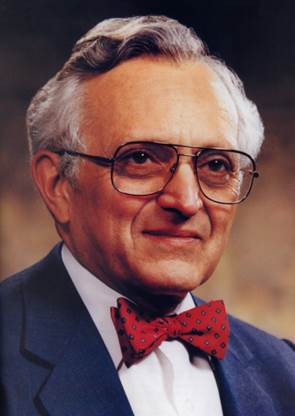
2002
Walter Hachborn
Walter Hachborn was a St. Jacob’s hardware retailer who developed a national vision. His idea was to inspire 120 independent hardware stores to form a dealer-owned distribution network. This kind of cooperation would make each of their local hardware stores stronger. Named the Hardware Retailer of the Century, Walter is also a member of the Waterloo County Hall of Fame. Under Walter’s humble leadership, the Home Hardware network grew to include 1100 dealer owned stores.
Admired for his warmth, personal touch and business acumen, Walter offered his talents to the Asthma Society of Canada, Waterloo Historical Society, Woolwich Community Health Clinic, Canadian Executive Service Organization, Wilfred Laurier University and the Lutheran Church Synod. The Mayors’ Dinner celebrated Walter Hachborn’s commitment to independent small businesses and to the well being of his community.
2003
Edna Staebler
Edna was born in 1906 in Berlin, Ontario (later Kitchener). She was a graduate of the University of Toronto, a teacher, a manager of the family business, and held prominent positions of community leadership. She is best known as a prolific writer of national and international stature.
In 1948, at age 42, Edna travelled to the Maclean’s offices in Toronto to present her first, unsolicited article to the editor. The article was accepted for publication, and she would quickly become a regular contributor to the leading magazines and newspapers of the time, including Maclean’s, Saturday Night, The Toronto Star, and Chatelaine. It was full-immersion journalism, documenting her time living with a community of Hutterites in Alberta, the Iroquois of the Six Nations, the crew of a freighter from Quebec, and a mining family in Wawa.
In 1950, Chatelaine published the article “How to Live Without Wars and Wedding Rings” about Edna’s experiences living with the Martins, an Old Order Mennonite family. It won the Canadian Women’s Press Club award. The best of her magazine articles were published as Whatever Happened to Maggie? (1983) and Places I’ve Been and People I’ve Known (1990).
In 1967, her first book was published. The following year Food That Really Schmecks was published, beginning her series of chatty, informal cookbooks featuring traditional Waterloo County recipes.
In 1991, she worked with Wilfrid Laurier University to establish the Edna Staebler Award for Creative Non-Fiction. She would also help Laurier students with endowments that honoured her friends Gerald Noonan and George Blackburn. Edna also worked with the Kitchener Public Library to endow an annual Writer-in-Residence program.
Among her many distinctions, she was named a member of the Order of Canada in 1996, received an Honourary Doctor of Letters Degree from Wilfrid Laurier University in 1984, was K-W Woman of the Year in 1980, and joined the Waterloo County Hall of Fame in 1998. She was also the first recipient of Cuisine Canada’s Lifetime Achievement Award in 1996, an Award that was named the “Edna” in her honour.
In 1997, at age 91, Edna was presented a Lifetime Achievement Award at the K-W Arts Awards. The same year she was also recognized by her literary peers when she delivered the Margaret Laurence Memorial Lecture at the Annual General Meeting of the Writers’ Union of Canada.
Edna died in September 2006 at age 100.
2004
Martin Buhr & Mary Bales
Mary Bales and Martin Buhr were honoured for their pioneering efforts in the development of affordable housing in Kitchener-Waterloo.
Mary Bales used enthusiasm and a realistic business sense to convert an old downtown Kitchener warehouse into Heartwood Place. People moving into this affordable housing community are recognizing the warm and caring spirit that went into this construction project.
Martin Buhr has gathered together Mennonites skilled in the business of housing development, researched the main factors that contribute to high rents, and have established Menno Homes to create affordable family housing.
Both Mary and Martin demonstrated that citizens can harness tremendous energy towards making housing in our communities affordable for all.

2005
John Thompson
John grew up in Mildmay, Ontario, where he was a community oriented organizer at an early age. When he was 13, John organized a fundraising campaign for the Canadian National Institute for the Blind. He studied economics at the University of Waterloo, and worked at a hockey camp during the summers. At 21, he started Huronia Hockey Camps, which he ran for 25 years. After attaining his university degree, John worked full time running the hockey camp for several years.
John returned to university to get a teaching certificate and completed that degree in 1976. That same year, John joined Kitchener-Waterloo Federated Appeal, a fundraising campaign initially started in 1941 for services in the community and to support the war effort. He worked there as assistant executive director until 1983, when following the sudden death of Bev Hayes, John became executive director. In 1984, Federated Appeal formally became the 106th member of United Way of Canada. During his tenure of 28 years, fundraising campaigns grew from $1 million to $5 million per year, staff grew from three to 13, and the volunteer network grew to more than 3,000 people.
John remained president of Huronia Hockey Camps until 1995. He worked for the Kitchener Rangers for seven years as a business manager, statistician, and radio commentator. He co-founded the Kitchener-Waterloo Athlete of the Year Program and established the Sports & Scholarships Golf Tournament, and also chaired various committees of the Kitchener Sports Association. He served as KSA president, played a role in the Canadian National Men’s Fast-Pitch Championships, International Softball Congress Championships, various charity golf tournaments, and reunions for the Waterloo Siskins Junior B and K-W Dutchmen hockey clubs.
John was also active with the local Chamber of Commerce and Drug Awareness Week. He was a founding director and treasurer of Waterloo Regional Crime Stoppers.
The Working Centre honoured John’s life-long commitment to building community at the 18th Annual Mayors’ Dinner.
2006
Donna Ward
Dr. Donna Ward is known for her commitment to excellent holistic care for people facing life threatening illness. She was the Acting Medical Director of the Supportive Care Program at the Grand River Hospital and the Regional Cancer Centre, and helped to establish programs at local acute care hospitals.
After ten years of family practice with her husband, Donna trained in the emerging disciple of palliative care. In 1988 Donna began to offer palliative care services locally in collaboration with community partners. Since that time regional palliative care teams have provided innovative palliative care, enhancing the lives of people with life threatening illnesses, facilitating their choices and allowing them to live and die with dignity. Hundreds of families in this Region readily share stories of how Donna has touched their lives and the lives of their families.
Donna Ward was recognized for the innovation and commitment she brings to this work. Donna is the first to admit that she works as part of a community team committed to these principles. The Mayors’ Dinner honoured both Dr. Donna Ward and the tremendous good work being done in this developing field of palliative care.

2007
John Jackson
John Jackson was a citizen of Kitchener who worked for almost thirty years as a dedicated environmentalist. He used his considerable organizing, writing and speaking skills to work with a wide range of citizen groups throughout Ontario, mainly on waste management, contamination issues, and Great Lakes ecology.
John was President for 6 years and a Board member for 25 years of Great Lakes United, which is a coalition of citizens, environmental, labour and conservation groups from Canada, the United States, and First Nations working to protect the Great Lakes. John was also the coordinator of the Citizens Network on Waste management, a coalition of grass-roots and citizens’ groups working on waste issues. John Jackson was a voice of encouragement for community groups and concerned citizens who are strategizing for ways to contribute to a sustainable environment and who are building healthy and strong communities. He invested himself as a community member, educator and advocate for real change, and embraced the role of facilitator for communities responding to local, national and global environmental issues.
The Mayors’ Dinner celebrated John’s life-long commitment to the environment and his support for communities taking tangible steps toward a sustainable future.

2008
Sylvia & Stephen Scott
Stephen and Sylvia Scott co-founded Caring Partners Global (CPG), a Canadian not for profit organization based in Waterloo, Ontario. CPG works in partnership with local, national and international organizations to improve the physical, emotional, spiritual and environmental health of disadvantaged and impoverished populations in developing countries. The impact of their work has touched many lives in their native country of Kenya in the village of Matangwe and surrounding communities. Their work has involved volunteers from across Canada and especially Kitchener-Waterloo. They have been instrumental in leading the implementation of health programs, education, agriculture, and water sanitation.
The Mayors’ Dinner celebrated Stephen and Sylvia’s long-term commitment to act as the bridge between rural Kenyan and Canadian cultures, generating goodwill and practical development.
2009
John & Donna Weber
John and Donna Weber were recognized for their unique contribution to community and sports organizations by celebrating their long-term commitment combining volunteer work with genuine hospitality.
John and Donna approached sports as essential community building activities and they have emphasized hospitality in their involvement. John has been past president of the Kitchener Sports Association, Kitchener Minor Baseball Association and the Inter County Baseball Association, and a long time executive of the Kitchener Panthers Baseball Club. Donna has been a fixture in the sports arena serving Minor Hockey, Minor Baseball, Tournament Baseball, Fastball and Hockey, The Memorial Cup and the World Women’s Hockey Championship. Donna’s hospitality and good food has highlighted all these sporting events. Currently she administers the Sponsored Children’s Program for Minor Hockey.
Donna and John are active in their community. John was Past Chairman of the Board of Governors of the Waterloo County Hall of Fame. He has served his church through youth programs, finance, education and student mutual aid. Donna’s volunteer work has involved church youth support, the Mennonite Relief Sale, and church catering. John and Donna have both been inducted into the Waterloo County Hall of Fame as volunteers and for community service.
2010
Lynda Silvester
In celebration of their 65th Anniversary, Hallman Construction joined us as a special sponsor in honouring Lynda Silvester.
The Mayors’ Dinner recognized Lynda Silvester for her exceptional work in promoting child literacy and working with the community to launch innovative educational programs in Waterloo Region and beyond. Lynda’s community development approach focused on building coalitions and community-wide approaches to create a community for our children to gain the skills, qualities and values to help them grow into healthy, productive community members. Lynda was known as a community resource for fresh educational ideas and team building.
Lynda was unique in that she had the ability to work with a group to shape a collective mission, but can just as easily get very practical about designing the steps necessary to advance that mission. Most people seem to gravitate towards either process or action, but Lynda was equally adept at both.
Lynda was integral in building Strong Start, a community-based volunteer-run children’s literacy program, Get Ready for School, and a Baby Literacy Project. She served as volunteer Chairperson for the first community planning table for the Early Years Initiative and participated actively for many years on the Alliance for Children and Youth of Waterloo Region to establish and advance its goals. Lynda was widely recognized for her deep knowledge of how children learn and her passion for engaging others to build capacity and community.

2011
Jim Erb
Jim Erb was chosen to be the Guest of Honour for the Twenty-Fourth Annual Mayors’ Dinner. For Jim, community building means extending the table, and always making room. New ideas take root in the community when we are inclusive, and when we share our gifts with others. This is Jim’s community philosophy, and we are recognizing his unique way of putting philosophy into action. When Jim became a partner, and then an owner, of Erb & Good Family Funeral Home, he expanded the vision of funeral services by integrating grief counsellors, bereavement groups, and welcoming spaces for grieving family members. Funerals teach us about our common humanity. Jim has had extensive involvement with groups like Big Brothers and the United Way of K-W.
He has been active as a director of the K-W Community Foundation, a founding member of Habitat for Humanity, the Canadian Clay and Glass Gallery and an organizer of the Community Prayer Breakfast. Jim has been a member of the Kitchener Conestoga Rotary Club for 27 years and since 2008 has taken the lead in helping the Club raise over $240,000 per year to provide the gift of food to over 10,000 people through the House of Friendship Christmas Hamper Project.
We celebrated Jim’s commitment to the work of community building by developing relationships, connecting people and extending the table to others.
2012
Margaret & Bob Nally
The Mayors invited Margaret and Bob Nally as Guest Hosts to narrate this event. As original Working Centre board members, The Working Centre took shape around the Nally’s kitchen table.
Margaret is a pastoral worker providing spiritual direction in workplaces, shelters, and churches, and serves on the boards of community organizations.
Bob Nally is an accomplished eco-entrepreneur whose designs and widely acknowledged business start-up skills are behind successful local companies like RDM and Virtek. The Working Centre developed into a model of bottom up, small-scale local work committed to cooperation, and helping people to shape their tools.
For 30 years, the people of The Working Centre, modeling cooperation, have developed over 30 vital initiatives through the Job Search Resource Centre, St. John’s Kitchen, Community Tools, Access to Technology, Transitional Housing and the Waterloo School for Community Development. Margaret and Bob will narrate the story behind these projects and the cooperation that is essential.
2013
Ron Schlegel
Ron Schlegel made a lifelong commitment to develop a social model to enhance Seniors quality of life and care. Ron traced his calling to growing up in his father’s family run nursing home where the family lived in an apartment. Developing a place for relationships has been central to Schlegel Villages. These Villages located throughout Southern Ontario are integrated, continuum care facilities with 2500 residents. Central to the design is the main street and town square which enrich social interaction like a village, reducing isolation.
As a professor in Applied Health Sciences at the University of Waterloo for 20 years Ron Schlegel was a principal developer of the Department of Health Studies and Gerontology, including developing three degree programs, now called School of Public Health and Health Systems. His commitment to develop new ways of providing better service for older adults led to the founding of the Schlegel – UW Research Institute for Aging in 2005.
The Schlegels also own and operate Homewood Health Centre in Guelph which serves 4000 patients annually plus a Canada-wide employee assistance company which provides coverage to 1,000,000 lives. The Schlegels have made investments in new urbanism through designing pedestrian-oriented and age friendly neighbourhoods that enhance health and personal wellness.
We celebrated Ron’s social vision of recreating small town connectedness. This has been accomplished with focused business acumen while remaining committed to building the spirit of people and their communities.

2014
Alex Mustakas
Alex Mustakas was the Guest of Honour for the 27th Annual Mayors’ Dinner. Recognized as a true visionary for the arts in Canada, Alex emigrated from Cyprus at the age of six. A natural performer at heart, he was always drawn to the stage, and to that end has spent the last 24 years enhancing the cultural life of multiple communities throughout Ontario while simultaneously benefiting local economies.
In addition to donating resources from his charitable arts organization to support the fundraising efforts of over 750 charities throughout Ontario, Alex has personally raised hundreds of thousands of dollars for local initiatives by spearheading successful collaborations with the Waterloo Regional Police Service, United Way of Kitchener-Waterloo, St. John’s Kitchen, and others. Alex has generously supported numerous community arts groups by providing his business acumen. He has also served on Advisory Boards to Conestoga College and Wilfrid Laurier University, the latter of which awarded him an Honorary Doctor of Letters in recognition of his lasting impact on Canada’s artistic and cultural landscape.
Alex is a proud recipient of the Queen’s Diamond Jubilee Medal. He was also awarded the Ernst & Young Entrepreneur of the Year Award for Media and Entertainment. We celebrated Alex’s outstanding contributions to the community as he embodies the spirit of entrepreneurship, creativity, and genuine passion that makes Kitchener-Waterloo such a desirable place to live, work, and of course, play.
2015
Murray Haase
Murray Haase is known as a driving force behind many local boards, committees and organizations. It is well known that when Murray Haase gets behind a project, he gives his complete dedication to helping that project become successful. Murray developed his community skills through building a successful business. While working in purchasing at the Four Wheel Drive Auto Company, Murray and his wife Merle opened a convenience store in Cambridge. He soon built up a chain of 30 Kwikie Minit Markets that were sold in the late 1980’s.
By 1985, Murray was named Citizen of the Year. He is known as a legendary fundraiser for organizations as diverse as Junior Achievement, Family and Children Services, both the Grand River and St. Mary’s Hospitals, and The Working Centre. As a new member of the Kitchener Conestoga Rotary Club he is credited with creating the Dream Home Lottery and is always the top ticket seller. Murray has chaired the Tree of Hope campaign and was a Lutherwood Board member for over 30 years. Murray is a long-time City of Waterloo volunteer on municipal committees. If there is a major sporting event, then you know that Murray is helping out behind the scenes.
We celebrated Murray’s significant contributions to the community and his unique grassroots fundraising approach that has benefited so many organizations throughout Kitchener-Waterloo.
2016
Ari Ariaratnam & Jassy Narayan
The 29th Mayors’ Dinner recognized the unique contributions to the community by Ari Ariaratnam and Jassy Narayan. Ari and Jassy are two exemplary women who have dedicated over 40 years working to support the experience of new Canadian women settling into Canada.
Ari Ariaratnam became an active immigrant settlement worker in K-W. She researched and developed what became Focus for Ethnic Women. Ari became its long-time Executive Director helping the organization become a place that welcomes and shares new cultures while offering skills training, supports and mentorship to women settling in Waterloo Region. Ari’s work with new Canadian women has been recognized by a Queen Elizabeth II Golden Jubilee Medal, a Citizenship and Culture Volunteer Service Award, and the KW Oktoberfest Women of the Year.
When Jassy arrived in Canada in the mid 1960’s she learned what it felt like to be out of place in a new culture. She found work, upgraded her education by attending part-time schooling for many years, eventually graduating with a MSW degree from WLU. By then she had established herself as a strong voice in the new Canadian community and for those economically challenged. As Executive Director of Onward Willow Better Beginnings in Guelph she demonstrated practical inclusive neighbourhood building. In her paid and volunteer work, Jassy is known as a tireless advocate for the marginalized and is the recipient of the Queen Elizabeth II Golden Jubilee Medal.
We celebrated Ari’s and Jassy’s commitment to supporting immigrant women and refugees in Kitchener-Waterloo by celebrating these stories of early beginnings, immigration, integration, and inclusion.
2017
Neil Aitchison
The 30th Mayors’ Dinner recognized Neil Aitchison. Born in nearby Harriston, Ontario, Neil has become a fixture in Waterloo Region as a media personality, a sales executive, a business development expert and a popular actor, speaker and MC. Neil has stood with The Working Centre as Master of Ceremonies for the Mayors’ Dinner for 28 years – he has helped us to build this event to be an important celebration of our diverse community.
Together we have honoured an amazing list of community builders – and each year Neil helped us to laugh at ourselves, to celebrate the contributions of each Guest of Honour, and to tease out the ways that each person made their unique contribution to our community. Neil uses humour to teach about personality, service and community as a speaker across Canada and the US. He has successfully co-written and performed Sorry I’m Canadian which brings Canadians together to learn about their history and to laugh about themselves. Presently, Neil is Senior Manager of Market Development for Melloul-Blamey Construction. He is a charter member of the Kitchener Westmount Rotary Club and has been named a Paul Harris Fellow three times, Rotary’s highest award for community service.
From the beginning, Neil has contributed behind the scenes to the building of Drayton Theatre. Neil was K-W Citizen of the Year in 2016. Neil serves as Master of Ceremonies for countless charities and public events. The 30th Annual Mayors’ Dinner celebrated the way Neil engages humour as a community building tool.
2018
Telling the Story of St. John's Kitchen
This 31st Mayors’ Dinner invited Arleen Macpherson, Gretchen Jones, and Jennifer Mains to join Neil Aitchison in sharing the story of how St. John’s Kitchen has embedded itself in the fabric of downtown Kitchener, providing a place of refuge and hospitality. Arleen, Gretchen and Jennifer form a chain that has been linked to St. John’s Kitchen almost from its beginning in 1985.
The chain begins with Arleen who began coordinating St. John’s Kitchen in 1988. During those years St. John’s Kitchen became a place of hospitality where the patrons became integral in producing the daily meal. In 2002 Arleen joined The Working Centre Board and this year is retiring as President.
Arleen hired Gretchen in 1991 after a year of volunteering and Gretchen has been the mainstay of St. John’s Kitchen coordinating the kitchen and volunteers for 26 years.
Jennifer started coordinating St. John’s Kitchen in 1999 and for 19 years has been committed to developing ever-increasing supports for those most disadvantaged through Downtown Street Outreach, Hospitality House, Psychiatric Outreach and the St. John’s Kitchen medical and dental clinics.
St. John’s Kitchen is a project of The Working Centre, and since 1985 has been serving a free daily lunch-time meal in the downtown core. People gather together to serve the meal, while building a culture of respect and acceptance.
2019
Grassroots Healthcare
The 32nd Mayors’ Dinner shared three stories of person-centred health care. These stories reflect the experience of six people who have embedded their medical practices in grassroots community work; stories that share creative ways to support and walk with people – practically, respectfully, and thoughtfully.
Dr. George Berrigan and Evelyn Gurney – a doctor and nurse team who worked 10 years past their retirement, through St. John’s Kitchen Clinic to provide primary care for people who are homeless/at risk of homelessness.
Dr. Chris Steingart and Michelle Steingart – who have worked together to create Sanguen Health Centre, a grassroots response for those living at risk of Hepititis C.
Dr. Mike Stephenson and Margaret Brockett who have developed Sanctuary Refugee Health Centre, a patient-centred health clinic to support refugees in Waterloo Region.
We celebrated and explored these exciting examples of compassionate health care that is re-imagined in creative ways.
2020
Climate Change & Sustainability
Frances Westley, J.W. McConnell Emeritus Professor of Social Innovation, University of Waterloo hosted the 33rd Mayors’ Dinner focusing on the work of developing sustainable practices in the midst of rapid acceleration of climate change.
As host, Frances brought four decades of research and community organizing around social innovation, sustainable development, strategic change, visionary leadership and inter-organizational collaboration. In 2019, she was recognized with 40 others from around the world by the Schwab Foundation for Social Entrepreneurship for their commitment to social innovation by driving change and shifting organizations and systems towards a more just, inclusive, sustainable future. Frances was recently given a Honourary Doctorate from Stockholm University for her work on the transformation to sustainable development and the importance of institutional entrepreneurs in resilience and socio-economic systems. She has collaborated for decades with natural scientists in order to improve how we relate to ecosystems, natural resources and biological diversity.
As Host of The 33rd Mayors’ Dinner, Frances shared a message of challenge and hope, highlighting the work being done at the grassroots in Waterloo Region. What is the role of civil society to meet the challenge of climate change?
2023
Responding to Homelessness
The 34th Mayors’ Dinner celebrated individual and collective examples of people working to respond to the challenges of homelessness in our community.
The evening featured outreach workers and individuals sharing powerful stories and their experiences of homelessness. Speakers from A Better Tent City described how the project came to be and how it holds together. The work involved with the Working Centre’s Making Home Project was also highlighted, including a speech by Craig Beattie from Perimeter Development describing in detail how businesses can be involved and build community partnerships.
The messages were strong and many people expressed a sense of hopefulness in the face of the complex issues of homelessness, recognizing the importance of community collaboration.
2024
Take Courage, Take Care
The 35th Mayors’ Dinner highlighted the importance of acting in determined hope in this age of insecurity that we find ourselves enveloped by. The goal of the evening was to see the significant personal action needed as we face the challenges of refugees, homelessness and climate change and to reflect on how we can act into these issues.
The Mayors’ Dinner program uniquely incorporated music, dance and a range of reflections. The performance of Leonard Cohen’s song Anthem highlighted the theme and embodied the spirit of the call to action. As part of the evening, workers in the field of employment counselling, settlement support, shelter and homelessness supports, and workers involved in climate change and environmental projects were invited to share their experiences, stories and perspectives.

2025
Knowing Our Neighbours
The 36th Mayors’ Dinner theme of Knowing our Neighbours directly faced the challenges of increasing isolation and dislocation with messages and examples of how people remain committed to shaping our communities and welcoming our neighbours with hope for a better world. The night’s reflections combined to deepen our understanding about the richness of diversity and the importance of being intentional neighbours.
We heard inspiring stories from Fauzia Mazhar and John Lougheed. Carol Taylor also welcomed speakers to the stage as she announced that the Making Home Capital Campaign reached its goal of $22 million raised to create 44 units of housing, a new home for St. John’s Kitchen, and a main floor medical clinic at 97 Victoria Ave N.
